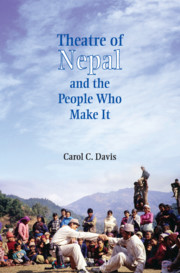Book contents
- Frontmatter
- Dedication
- Contents
- List of Figures
- Acknowledgements
- Prologue
- 1 From Darkness to Light: Antiquity through the Malla Golden Age
- 2 Ruthless Rulers: The Rise of the Shah and the Rana Takeover
- 3 The Drama of Nationalism: Sama Engaged
- 4 Modernism's Advance: Post-Sama Dramatists
- 5 The Pro-Democracy Movement: Ashesh Malla Takes to the Streets
- 6 Cultivating Theatre Aesthetics: Sunil Pokharel's Vision
- 7 Diaspora: Urban Theatre Outside the Capital
- 8 Legacy: Contemporary Theatre in the Kathmandu Valley
- Bibliography
- Index
5 - The Pro-Democracy Movement: Ashesh Malla Takes to the Streets
Published online by Cambridge University Press: 26 April 2019
- Frontmatter
- Dedication
- Contents
- List of Figures
- Acknowledgements
- Prologue
- 1 From Darkness to Light: Antiquity through the Malla Golden Age
- 2 Ruthless Rulers: The Rise of the Shah and the Rana Takeover
- 3 The Drama of Nationalism: Sama Engaged
- 4 Modernism's Advance: Post-Sama Dramatists
- 5 The Pro-Democracy Movement: Ashesh Malla Takes to the Streets
- 6 Cultivating Theatre Aesthetics: Sunil Pokharel's Vision
- 7 Diaspora: Urban Theatre Outside the Capital
- 8 Legacy: Contemporary Theatre in the Kathmandu Valley
- Bibliography
- Index
Summary
In search of theatre I went to the streets to perform
—Ashesh MallaWhen King Tribhuvan died in 1955, fledgling political parties aggressively vied for power in the new system of government. While these parties had successfully fomented rebellion against the Ranas, they were ill-equipped to function effectively as democratic players, and ‘factional strife led to mass demonstrations and strikes’ (Bista, 1991: 103). Unable to elevate the quality of life as promised in the new democracy and with few positive results, ‘by 1958 the system had been enervated’ (ibid.) and King Mahendra decided to return the country to autocratic rule. In 1960, King Mahendra staged a royal coup in which he ‘declared all parties illegal, closed down the parliament, arrested and imprisoned all cabinet members then in Kathmandu [including the Prime Minister], and took the government into his own hands’ (ibid.). In 1962, King Mahendra amended the constitution and formed the first Rastriya (National) Panchayat instituting a party-less system of governance. The panchayat system, a pyramid of councils or rule by elders, sought to give the illusion of local participation and self-governance, and to appear to represent the people fairly, while, in reality, permitted real power to remain solely with the King, who continued to rule despotically.
Throughout the 1960s, 1970s, and 1980s, an atmosphere of repression and disregard prevailed as the government tightened its grip around society. When King Mahendra died of a heart attack during a hunting trip in the Terai in 1972, his eldest son, the Eton and Harvard educated Crown Prince Birendra took the throne. While one of the first dictates of the new King Birendra Bir Bikram Shah Dev (1945–2001, r. 1972–2001) was to make education available and free to every child in Nepal, he also maintained the panchayat his father had promulgated. Corrupt officials at all levels and neglect of the peoples’ concerns characterized the panchayat system. Panchayat denied even basic freedoms to regular citizens, such as speech and press, quite notably. Throughout these decades, banned coalitions agitated for multiparty democracy although the campaigners were persecuted, arrested, tortured, and even killed for their actions.
- Type
- Chapter
- Information
- Theatre of Nepal and the People Who Make It , pp. 49 - 70Publisher: Cambridge University PressPrint publication year: 2019



